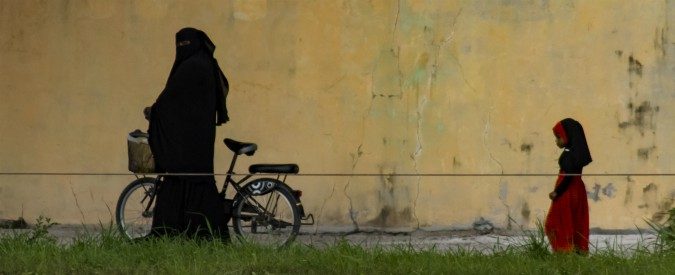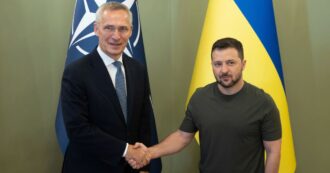Among the branches of the tallest tree, there is still a branch that is not a branch, actually, but a pole. A while ago, there was the al-Qaeda flag. Because a while ago, this was not Himandhoo Island: for its 600 inhabitants, it was Himandhoo Emirate.
We are just 50 miles away from Male. But somehow, we are in a different country.
The Maldives enforce quite a strict interpretation of Sharia law. Like in Pakistan. In Saudi Arabia. What is allowed to tourists, is mostly forbidden. Alcohol. Or sex outside marriage: it is punished with a hundred lashes. Only Muslims can be citizens here: you can’t have another religion. Or no religion. And Islam is the main subject in all schools, at all levels. But in Himandhoo Sharia law is, if possible, even harsher than that. In the name of true Islam, of Islam as it was practised at the time of the Prophet, here even music is banned. Even though at the time of the Prophet, the Maldives were actually Buddhist. In the oldest mosques, the direction of Mecca is pointed at by the floor, by the diagonal pattern of its tiles. They weren’t mosques, originally: they were temples. “Islam, this kind of Islam, so extreme, is not tradition, at all, it’s innovation,” I am told by Mariyath Mohamed, a journalist. “Thirty years ago, no woman was veiled.”
Today, instead, they are all in niqab.
They are all totally covered. Totally black.
It all started under president Maumoon Abdul Gayoom, she says. The mastermind of resorts, and together with resorts, of the Maldives themselves: back then, they were just a poor archipelago in the middle of nowhere. He has been in power from 1978 to 2008, and somehow, he is still in power: the current president is his stepbrother. “He was a graduate of al-Azhar, in Cairo, the most authoritative institution for Islamic studies. And since he had no popular legitimacy, he relied on religious legitimacy. He justified all his decisions as Quran prescriptions. And so his opponents ended up justifying all their demands along the same lines.”
“Here Islam,” she says, “not only is not tradition, it is not religion. It is politics.”
Because the 1970s were also the years of petrodollars. And with petrodollars, of the rise of Saudi Arabia. With its scholarships, many students went abroad, in the al-Azhar of the Arab world: and when they returned, they challenged Gayoom’s monopoly over Islam. “They were persecuted and jailed, one by one. They were tortured. Killed. And turned into heroes. Because in Europe, you think of Islamists as a symbol of oppression, but here, and not only here, for many years they have been the opposite: a symbol of freedom.”
And quite often, that’s what they still are. At sunset, there is no one around. Only the sound of the sea, and this silver air: it is the dim light of stars, mirrored in the satellite dishes: because many families are on Skype. On the phone with brothers, with cousins, friends on the frontline. With young men like Mohammed, who speaks from Aleppo, with a steady voice even in the heat of the battle: and who views Syria, simply, as a just war. “Half a million dead,” he says, “and you wonder why I am here? I came to Syria for your same reason: to stop this bloodshed,” he says. “Only, I prefer actions to words.” But it is a just war also because it is viewed as the beginning of much more. Because in the Maldives 5 percent of the population owns 95 percent of the country’s wealth: but that’s not an exception anymore. “Today a minority owns it all. How much is it?,” he says, “10 percent of the world’s population? And yet you don’t think that such a world is a world that can’t go on. You simply want to be within that 10 percent.”
“And then you say: You are violent,” he says. “You have a war at home.”
Not everybody supports al-Qaeda, of course. At all. A group of twenty-somethings is nailing down the last planks and sweeping the sand: they are opening a café. The Chucks. And they’d like to drink a beer sometimes. To listen to music. But to be against al-Qaeda doesn’t mean to be on our side. “And why we should?,” I am told by one of them. “For you, there is nothing else. There is only your life style, your kind of economy. Of society. Anything else, doesn’t matter. Anything else for you is just underdevelopment,” he says. “But your model doesn’t work. If you have everything, it’s because all the others have nothing. You are not the smartest; you are simply the strongest. Simply the rulers. I don’t want to be among the exploited. But truthfully, I don’t even want to be in the minority of the exploiters.”
“I don’t agree with al-Qaeda. But the Caliphate, the attacks, they are all wrong solutions to right problems. To real problems,” he says. “Forget jihadists’ answers. Focus on the needs they try to meet, focus on their questions. Because they are the questions of all of us.”
Articolo Precedente
Malé, the hidden paradise of the jihad

Articolo Successivo
Thilafushi, the Maldives’ bin






